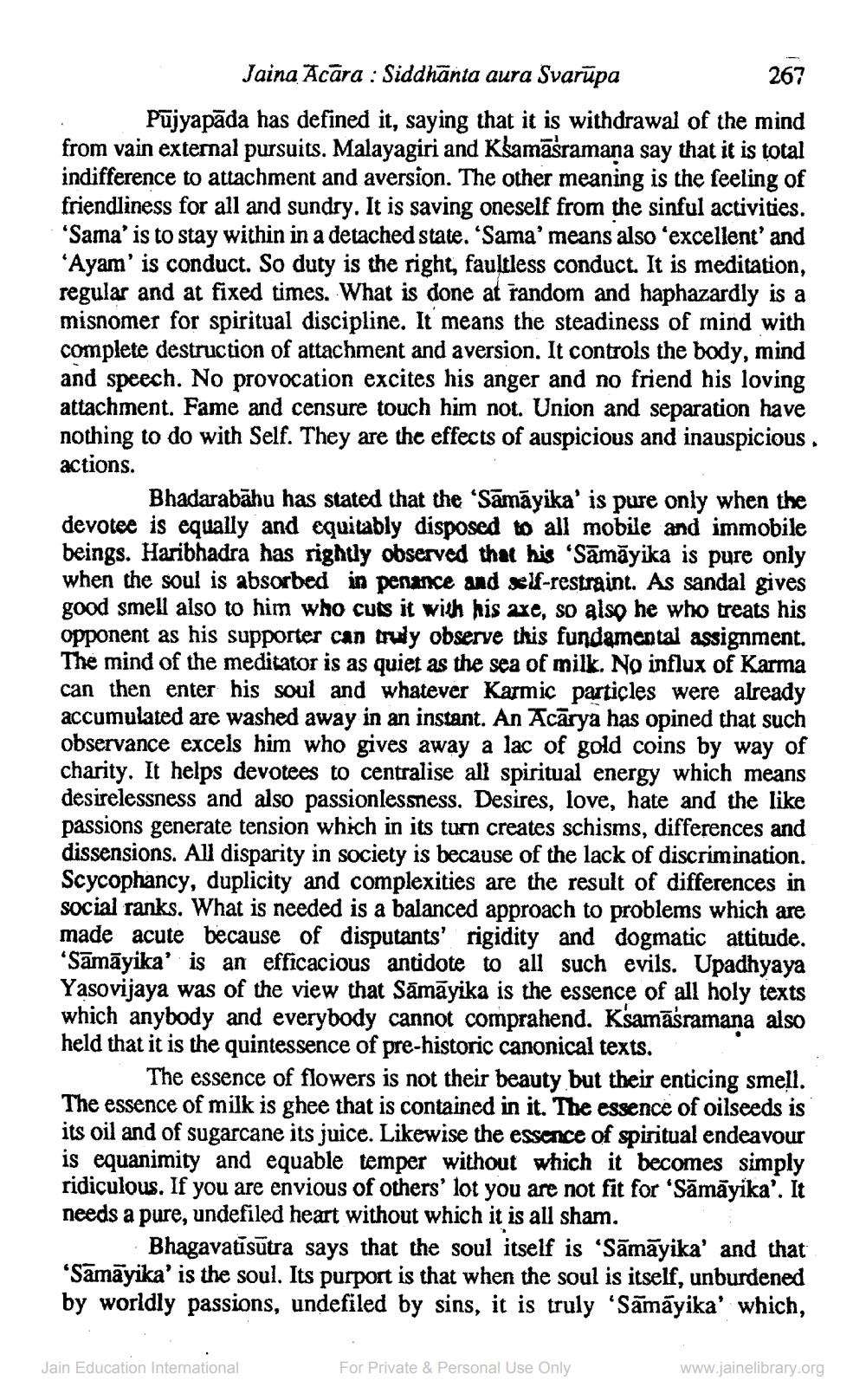________________
Jaina Acara : Siddhanta aura Svarüpa
267 Pujyapāda has defined it, saying that it is withdrawal of the mind from vain external pursuits. Malayagiri and Kšamāsramana say that it is total indifference to attachment and aversion. The other meaning is the feeling of friendliness for all and sundry. It is saving oneself from the sinful activities. Sama' is to stay within in a detached state. 'Sama' means also 'excellent' and 'Ayam' is conduct. So duty is the right, faultless conduct. It is meditation, regular and at fixed times. What is done at random and haphazardly is a misnomer for spiritual discipline. It means the steadiness of rnind with complete destruction of attachment and aversion. It controls the body, mind and speech. No provocation excites his anger and no friend his loving attachment. Fame and censure touch him not. Union and separation have nothing to do with Self. They are the effects of auspicious and inauspicious. actions.
Bhadarabāhu has stated that the 'Sāmāyika' is pure only when the devotee is equally and equitably disposed to all mobile and immobile beings. Haribhadra has rightly observed that his 'Sāmāyika is pure only when the soul is absorbed in penance and self-restraint. As sandal gives good smell also to him who cuts it with his axe, so also he who treats his opponent as his supporter can truly observe this fundamental assignment. The mind of the meditator is as quiet as the sea of milk. No influx of Karma can then enter his soul and whatever Karmic particles were already accumulated are washed away in an instant. An Acārya has opined that such observance excels him who gives away a lac of gold coins by way of charity. It helps devotees to centralise all spiritual energy which means desirelessness and also passionlessness. Desires, love, hate and the like passions generate tension which in its turn creates schisms, differences and dissensions. All disparity in society is because of the lack of discrimination. Scycophancy, duplicity and complexities are the result of differences in social ranks. What is needed is a balanced approach to problems which are made acute because of disputants' rigidity and dogmatic attitude. 'Samāyika' is an efficacious antidote to all such evils. Upadhyaya Yasovijaya was of the view that Sāmāyika is the essence of all holy texts which anybody and everybody cannot comprahend. Ksamāsramana also held that it is the quintessence of pre-historic canonical texts.
The essence of flowers is not their beauty but their enticing smell. The essence of milk is ghee that is contained in it. The essence of oilseeds is its oil and of sugarcane its juice. Likewise the essence of spiritual endeavour is equanimity and equable temper without which it becomes simply ridiculous. If you are envious of others' lot you are not fit for 'Sāmāyika'. It needs a pure, undefiled heart without which it is all sham.
Bhagavatīsutra says that the soul itself is 'Sāmāyika' and that 'Samāyika' is the soul. Its purport is that when the soul is itself, unburdened by worldly passions, undefiled by sins, it is truly 'Sāmāyika' which,
Jain Education International
For Private & Personal Use Only
www.jainelibrary.org




